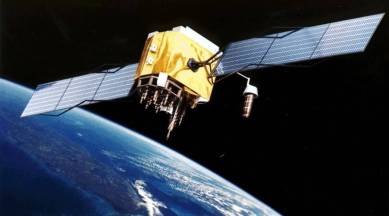Stay updated with the latest - Click here to follow us on Instagram
US appeals court rejects Devas Multimedia’s plea for rehearing over $1.2 bn compensation from ISRO’s Antrix Corp
The Aug 2023 order, for which rehearing was sought, was a major relief for Antrix Corp years after the UPA government’s move to annul a 2005 satellite deal between Devas Multimedia and Antrix.

A court of appeals in the United States has rejected pleas by the Bengaluru-founded satellite communication start-up Devas Multimedia for rehearing by a full court an August 1, 2023 decision by the court overruling the confirmation of a $1.2 billion arbitration award against the Indian Space Research Organisation’s (ISRO) Antrix Corp.
“The petitions for rehearing en banc are denied. No further petitions for rehearing or rehearing en banc will be entertained,” the United States Court of Appeals for the Ninth Circuit ruled in a February 6 order.
monthly limit of free stories.
with an Express account.
Foreign investors and a US subsidiary of the start-up – which has been liquidated in India on the grounds of fraud in its creation – had approached the appeals court for a full court rehearing of a plea that the court had adjudicated in August last year in favour of Antrix Corp, the commercial arm of ISRO.
On August 1, 2023, the US appeals court had ruled that a US district court “erred in exercising personal jurisdiction over Antrix Corp Ltd, an Indian corporation, under the Foreign Sovereign Immunities Act, because plaintiff (Devas) failed to establish that Antrix had the requisite minimum contacts for personal jurisdiction.”
The order was a major relief for Antrix Corp and the Indian government which is fighting legal battles all over the world in connection with a 2011 decision of the UPA government to annul a satellite deal inked in 2005 by Devas Multimedia and Antrix for the launch of satellite digital multimedia services akin to satellite internet services that is currently on the anvil of launch by multiple service providers in India.
The UPA government annulled the satellite deal in February 2011 citing the requirement of space spectrum allocated for the satellite service for security needs. The deal was cancelled after it was cited as another instance of corruption under the UPA regime after the 2G scam.
An International Chamber of Commerce arbitration tribunal awarded a compensation of $ 1.2 billion to Devas Multimedia and investors for the cancellation on September 14, 2015, and the US Federal Court for the Western District of Washington confirmed the award on October 27, 2020.
Antrix Corp moved the US appeals court against this order. The US court ruled on August 1, 2023 that Antrix enjoyed immunity under the US Foreign Sovereign Immunities Act (FSIA) and that the district court of Washington had erroneously overruled this fact while confirming the arbitration award and allowing Devas Multimedia to register the order in parts of the US to seize assets linked to Antrix Corp.
“It follows that if a foreign state is not a person and thus not entitled to a minimum contacts analysis through the Constitution, it is still entitled to a minimum contacts analysis through our reading of the FSIA. Thus, the district court erred in ignoring our precedents requiring it to conduct a minimum contacts analysis,” the US appeals court ruled in August last year.
“Devas has failed to meet its burden under the first prong to show that Antrix purposefully availed itself of the privilege of conducting activities in the United States. Devas primarily relies on the Antrix and Indian Space Research Organization (“ISRO”) Chairman’s 2003 visit to Washington DC to meet with Forge Advisors and a series of 2009 meetings between ISRO officials and the Devas team,” the appeals court stated in its August 1 order.
“Principles of comity, diplomacy, and international law, including “a panoply of mechanisms in the international arena,” protect the interests that foreign states have in resisting the jurisdiction of United States courts,” one of the three judges on the bench said last year.
Under the failed 2005 Antrix-Devas deal, ISRO was supposed to lease two communication satellites to Devas Multimedia for 12 years at Rs 167 crore. The start-up was to provide multimedia services to mobile platforms in India using the space band or S-band transponders on ISRO’s GSAT 6 and 6A satellites built by ISRO at a cost of Rs 766 crore.
After the NDA government came to power in 2014, the CBI and ED began investigating the deal even as the foreign investors in Devas Multimedia – German telecom major Deutsche Telekom, three Mauritius investors – and Devas Multimedia itself approached various international tribunals seeking compensation for the failed deal.
Devas Multimedia was awarded $ 1.2 billion by an International Chamber of Commerce (on September 14, 2015), Deutsche Telekom was awarded a $ 101 million compensation by the Permanent Court of Arbitration in Geneva, the Mauritius investors were awarded a $ 111 million by United Nations Commission on International Trade Law (UNCITRAL).
The National Company Law Tribunal in India ordered the liquidation of Devas Multimedia on May 25, 2021, citing fraudulence in its creation. The NCLT order was upheld by the Supreme Court of India on January 17, 2022.
The Enforcement Directorate and the Central Bureau of Investigation in India are currently pursuing cases of money laundering and corruption in India against Devas and its officials. Former ISRO chairman G Madhavan Nair is among those accused in the CBI case